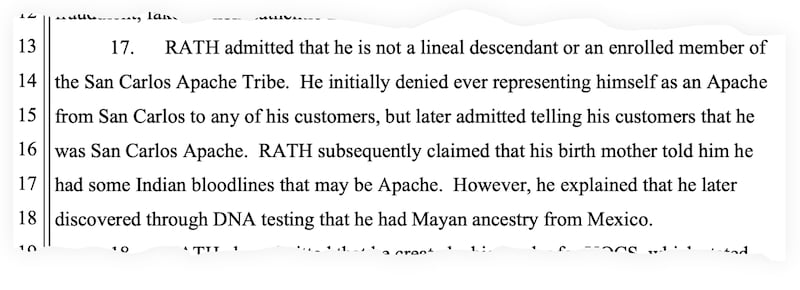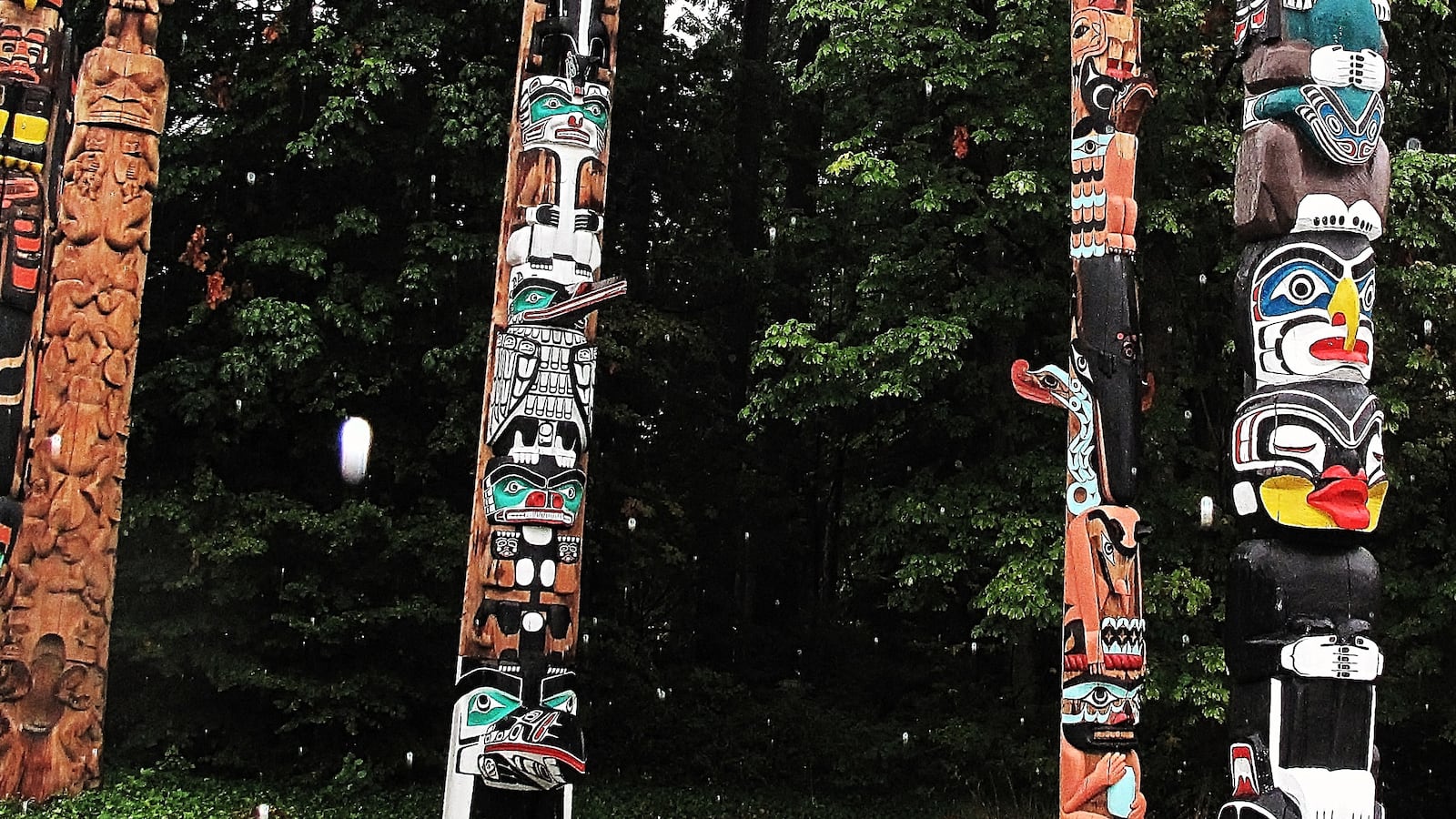A Washington State artist who portrayed himself as a member of the San Carlos Apache tribe has for years misrepresented his heritage, deceiving collectors who thought they were buying authentic Native American carvings, according to federal investigators.
Lewis Anthony Rath, who is known for his wood carvings and totem poles, “admitted that he is not a lineal descendant or an enrolled member of the San Carlos Apache Tribe,” states a Nov. 23 criminal complaint reviewed by The Daily Beast. According to the filing, Rath, 52, told agents from the U.S. Fish and Wildlife Service (FWS) that “his birth mother told him he had some Indian bloodlines that may be Apache. However, he explained that he later discovered through DNA testing that he had Mayan ancestry from Mexico.”
Rath, who goes by “Tony,” is now facing three counts of misrepresentation of Indian produced goods and products, and two counts of unlawful possession of migratory bird parts, including golden eagle feathers. The top charge carries a maximum sentence of five years in prison.
The Indian Arts and Crafts Act of 1990 is a truth-in-advertising law that makes it a crime to sell counterfeit Native American artifacts and collectibles. Frequently knocked-off items by non-Natives include “Indian-style jewelry, pottery, baskets, carved stone fetishes, woven rugs, kachina dolls, and clothing,” according to the U.S. Department of the Interior (DOI).
In 2015, Kansas City artist Terry Lee Whetstone was convicted of falsely portraying himself as Cherokee while marketing his work as Native art. Another popular “Cherokee” artist, Jimmie Durham, was later discovered to have no Cherokee relatives at all. Earlier this year, the feds dismantled a multinational crime ring selling imitation Native American jewelry sourced from a factory in the Philippines.
“Native American art fraud is a serious crime that hurts consumers and severely impacts the economic and cultural livelihood of Native American artists, craftspeople and Tribes,” FWS official Edward Grace said in a statement last April after a Texas man was indicted under the Indian Arts and Crafts Act.
Rath’s present troubles can be traced back to July 2018, when the DOI’s Indian Arts and Crafts Board received a complaint that Rath was holding himself out to be San Carlos Apache, and selling his work as “Indian produced,” the complaint against him states.
FWS agents subsequently contacted the San Carlos Apache Tribal Enrollment Department, which, according to the complaint, said Rath was not “an enrolled tribal member or Indian artisan registered with the Tribe.”The following year, undercover FWS agents bought a carved wooden totem pole and a necklace Rath had made from a Seattle art gallery.
“The gallery owner told Agents that Rath was a Native American and provided a written copy of Rath’s biography, which stated Rath was San Carlos Apache,” the complaint explains.
The same day, the undercover agents purchased a carved wooden mask and a totem pole by Rath from another gallery in Seattle.
“A store employee provided Agents a copy of Rath’s biography, which stated he was San Carlos Apache,” the complaint continues. “The employee told Agents that she had written the biography based on information Rath had provided regarding his tribal affiliation.”FWS agents then established direct contact with Rath on Facebook, and commissioned him to carve two wooden totem poles for $1,200. During the negotiations, Rath “misrepresented himself as a San Carlos Apache and his artwork as Indian produced,” according to the complaint.
On Dec. 19, 2019, FWS agents raided Rath’s home. They seized carving tools, design notes, receipts for sales of Rath’s art, and feathers from protected bird species. In a handwritten note found in Rath’s residence, he allegedly described himself as an “Apache Artist of 27 years.” Rath “initially denied” telling anyone he was from the San Carlos Apache tribe, eventually confessing to agents that the DNA test he took showed he in fact had Mayan ancestry, the complaint states.

Agents subpoenaed records linked to Rath’s three Facebook accounts, and allege Rath “inferred or identified himself as Apache and/or Native American” to buyers more than two dozen times. One customer interviewed by agents said Rath told him he was “Apache, Mexican and Mayan.” Another told agents Rath billed himself as “Apache and Mayan.”
When agents interviewed the Seattle gallery owner, he denied abetting Rath’s alleged deceptions.
Rath “told him he was Native and that he believed him,” according to the complaint.
Another Seattle gallerist said she “had written Rath’s biography from information Rath had provided.”
Rath, who was charged Tuesday and does not yet have a lawyer listed in court records, did not immediately respond to a request for comment.






